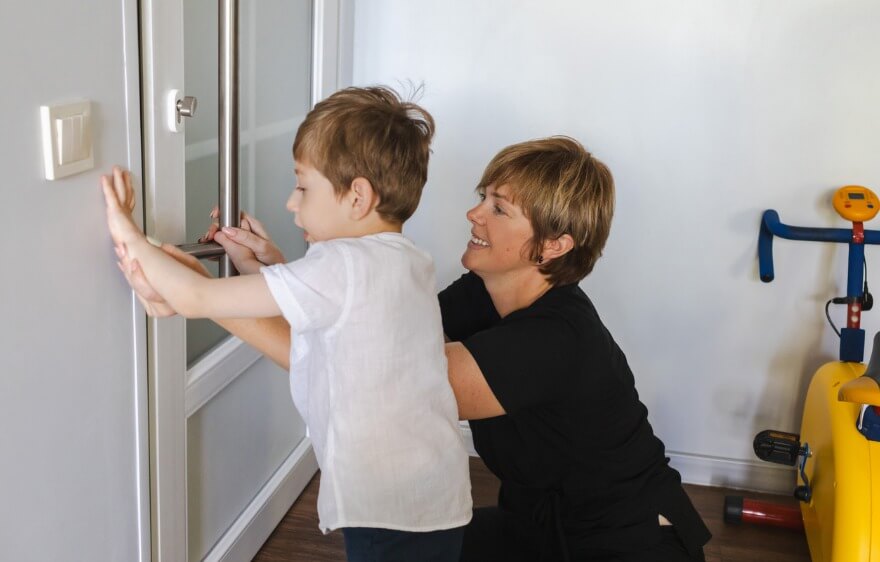As parents, we’re always tuned in to our child’s development, celebrating every milestone, from their first smile to their first steps. But sometimes, we might notice something that just doesn’t seem quite right. It could be anything from your child struggling with everyday tasks to having a hard time in school to facing challenges with social interactions. These little signals can sometimes be signs that your child might benefit from occupational therapy (OT).
Occupational therapy is a wonderful resource designed to help children overcome hurdles that might be holding them back. But why would a child need occupational therapy and when does it become necessary? Let’s dive into what pediatric occupational therapy is all about and explore some key signs that it might be time to seek help.
What is Pediatric Occupational Therapy?
Pediatric occupational therapy focuses on helping children develop the skills they need to grow, learn, play, and interact with the world around them. Unlike physical therapy, which typically addresses mobility issues, occupational therapy zeroes in on the “occupations” of childhood. These are the everyday activities that children engage in as they develop, such as dressing themselves, writing, playing, and socializing with peers.
An occupational therapist works with children to improve their fine motor skills, gross motor skills, sensory processing abilities, social interactions, and more. The goal is to empower children to participate fully in their daily lives, whether at home, in school, or on the playground. For kids who face challenges in these areas, OT can be a game-changer.
12 Signs Your Child May Need Occupational Therapy
So, you may have been wondering why would a child need occupational therapy. Here are some signs that might indicate why a child would need occupational therapy:
1. Delays in Meeting Developmental Milestones
Children develop at their own pace, but if your child is consistently behind in reaching key milestones, such as crawling, walking, or talking, it could be a sign that they need some extra support. Delays in milestones like sitting up, grasping objects, or learning to dress themselves might suggest difficulties with motor skills or coordination that OT can address.
2. Difficulty with Fine Motor Skills
Fine motor skills involve the small muscles in the hands and fingers, and these are crucial for tasks like writing, buttoning clothes, or using utensils. If your child struggles with activities that require precise hand movements—like holding a pencil, cutting with scissors, or tying shoelaces—it could be a sign why they would need occupational therapy to strengthen these skills.
3. Challenges with Gross Motor Skills
Why would a child need occupational therapy? Gross motor skills are a very common reason! These involve larger muscle groups, such as those used in walking, running, jumping, or climbing. If your child has difficulty with balance, coordination, or strength—such as frequently tripping or avoiding physical activities—it might be worth exploring OT to help them build these essential skills.
4. Sensory Processing Issues
Does your child seem overly sensitive to certain textures, sounds, or lights? Or perhaps they seem to crave sensory input, constantly moving, fidgeting, or seeking out activities that involve intense sensations. These could be signs of sensory processing issues, where the brain has trouble interpreting and responding to sensory information. OT can help children with sensory challenges by teaching them how to manage their sensory responses and adapt to their environment.
5. Struggles with Self-Care Tasks
Everyday tasks like brushing teeth, getting dressed, or feeding themselves are part of a child’s growing independence. If you’ve noticed struggles with self-care tasks that other children their age can do, it might be a sign that they need some additional support. Whether it’s trouble with zippers, buttons, or managing utensils, OT can help children develop the coordination and problem-solving skills needed to take care of themselves.
6. Difficulty with Handwriting
Why would a child need occupational therapy for handwriting? It’s a common question and a relatively common reason why a child would need OT. While seemingly simple, handwriting is a complex skill that involves fine motor coordination, visual perception, and cognitive processing. If your child’s handwriting is illegible, inconsistent, or causes them frustration, it might indicate an underlying issue that OT can help with. Occupational therapists can work with children to improve their pencil grip, letter formation, and overall handwriting fluency.
7. Social Interaction Challenges
Children who have trouble making friends, playing with peers, or understanding social cues might benefit from occupational therapy. Social skills are a key part of development, and OT can help children who struggle with interacting with others by teaching them how to communicate, share, take turns, and navigate social situations more effectively.
8. Attention and Focus Difficulties
If you’re asking yourself, “Why would a child need occupational therapy for focus?” You’re not alone. It’s not an immediate thought for most parents. However, if your child has trouble paying attention in school, staying on task, following instructions, or has been diagnosed with ADHD, occupational therapy can help. Attention and focus are critical for learning and participating in activities, and OT can offer strategies and interventions to improve concentration and task management.
9. Behavioral Concerns
Similarly, you might wonder, “Why would a child need occupational therapy for behavior?” Surprisingly, OT helps children with frequent tantrums, meltdowns, or oppositional behaviors. These behaviors can often be linked to underlying challenges in sensory processing, emotional regulation, or frustration with tasks that are difficult for your child. Occupational therapy can help identify the root causes of these behaviors and teach your child coping strategies and self-regulation techniques.
10. Avoidance of Certain Activities
If your child consistently avoids certain activities, whether it’s because they find them too challenging, uncomfortable, or overwhelming, it might be worth looking into occupational therapy. Avoidance can sometimes indicate that a child is struggling with a specific skill or sensory experience, and OT can help them overcome these hurdles and engage more fully in their world.
11. Challenges with Play Skills
All children love to play, so why would a child need occupational therapy for that? Play is actually a child’s main occupation and a vital part of their development. If you have noticed difficulty engaging in age-appropriate play, playing with toys in a typical manner, or participating in imaginative play, your child could benefit from occupational therapy. Play skills are crucial for learning, socializing, and creativity, and OT can support your child in developing these skills!
12. Challenges with Emotional Regulation
If your child frequently experiences intense emotions and struggles to manage them — such as having frequent outbursts, difficulty calming down after becoming upset, or trouble understanding and expressing their feelings — it could be a sign that they need support with emotional regulation. Occupational therapy can help children develop strategies to identify and manage their emotions, build resilience, and improve their overall emotional well-being. By learning how to regulate their emotions, children can better navigate social situations, handle stress, and engage more positively with their environment.
How Occupational Therapy Can Help
If you’ve read the answers to the question, why would a child need occupational therapy, and noticed one or more of these reasons apply to your child, consider a consultation with a therapist. The earlier you address these challenges, the better the outcomes can be. Here’s how OT can make a difference:
- Individualized Assessment and Treatment: An occupational therapist will conduct a thorough assessment of your child’s abilities, challenges, and goals. OTs create a personalized treatment plan tailored to your child’s unique needs, focusing on the areas where they need the most support.
- Skill Development: Through fun, engaging activities, occupational therapy helps children develop the skills they need to succeed in everyday life. This might include exercises to improve fine motor skills, sensory integration techniques, or activities that build social and communication skills.
- Parent and Caregiver Involvement: Occupational therapy isn’t just about the sessions themselves—it also involves educating parents and caregivers on how to support their child’s development at home. Therapists can provide strategies, tips, and activities that you can incorporate into your daily routine to help your child progress.
- Building Confidence and Independence: One of the key goals of occupational therapy is to help children build confidence in their abilities and become more independent. By mastering new skills and overcoming challenges, your child can gain a sense of accomplishment and self-esteem that will carry over into all areas of their life.
Helping Families Achieve Their Best Balance
As parents, we always want the best for our children, and sometimes that means seeking out extra support to help them reach their full potential. If you’ve wondered why would a child need occupational therapy, it might be time to consult with a therapist. There is support for kids struggling with certain tasks and milestones, and you don’t have to do it alone. Every child is different, and getting the support needed to grow and succeed can be a positive step on your family’s journey.
Occupational therapy is all about empowering children to live their best lives — whether that’s by helping them master new skills, navigate sensory challenges, or build social connections. If you’re curious about how OT could benefit your child, don’t hesitate to reach out to a pediatric occupational therapist for more information. With the right support, your child can overcome obstacles and achieve their goals, one step at a time.
Schedule Your Child’s Care Assessment Today
At Care Options for Kids, we understand the unique challenges of caring for a child with health conditions. Our dedicated team of pediatric home health nurses is here to support your family with compassionate, expert care tailored to your child’s needs. Contact us today to schedule an assessment and learn how we can help you navigate this journey with confidence and care.
Click here to start your journey to better care.
This post is for educational and informational purposes only. You should always speak with your own therapist before implementing this information on your own.






